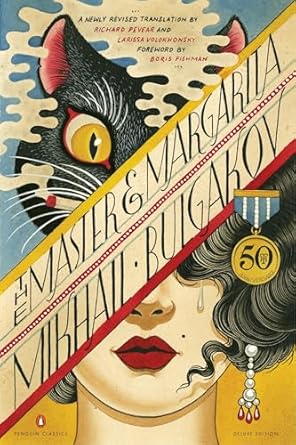The Master and Margarita by Mikhail Bulgakov
About the Author
Mikhail Bulgakov was a Russian novelist, playwright, and satirist whose works boldly criticized Soviet society under Stalin’s rule. Known for his dark humor and imaginative storytelling, Bulgakov struggled with censorship throughout his career—many of his manuscripts were banned or destroyed. The Master and Margarita is widely regarded as his masterpiece, blending fantasy, political satire, romance, and philosophy into one extraordinary narrative.
Story in Brief
Set in 1930s Moscow, The Master and Margarita weaves two parallel tales: one follows the Devil, disguised as a mysterious foreigner named Woland, who visits the city and exposes the greed and hypocrisy of Soviet officials; the other tells of the Master, a writer persecuted for his novel about Pontius Pilate, and Margarita, his devoted lover who makes a pact with the Devil to reunite with him.
The novel shifts between satire and spiritual allegory, exploring love, freedom, truth, and the eternal battle between good and evil.
Challenges / Bans
Bulgakov’s novel faced decades of suppression before it could be read freely:
1930s–1960s (Soviet Union): Completely banned by Soviet censors for its open critique of atheism, corruption, and state power. The book’s religious themes and portrayal of the Devil clashed with the USSR’s anti-religious ideology.
1966 (First Publication): Released in a heavily censored version; many chapters were removed or altered.
Modern Challenges: Periodically targeted by religious groups in Russia for “blasphemy” and “immorality.” Some schools and libraries have faced calls to restrict it for its depictions of Satanic elements and sexual themes.
Why It’s Still Important
The Master and Margarita is more than a novel—it’s a daring act of artistic resistance. Bulgakov used fantasy to tell truths that could not be spoken openly in his time. The book reminds readers that even in an oppressive world, imagination and love remain unbreakable forces. To read it is to experience one of literature’s boldest defenses of art, freedom, and the human soul.

